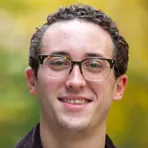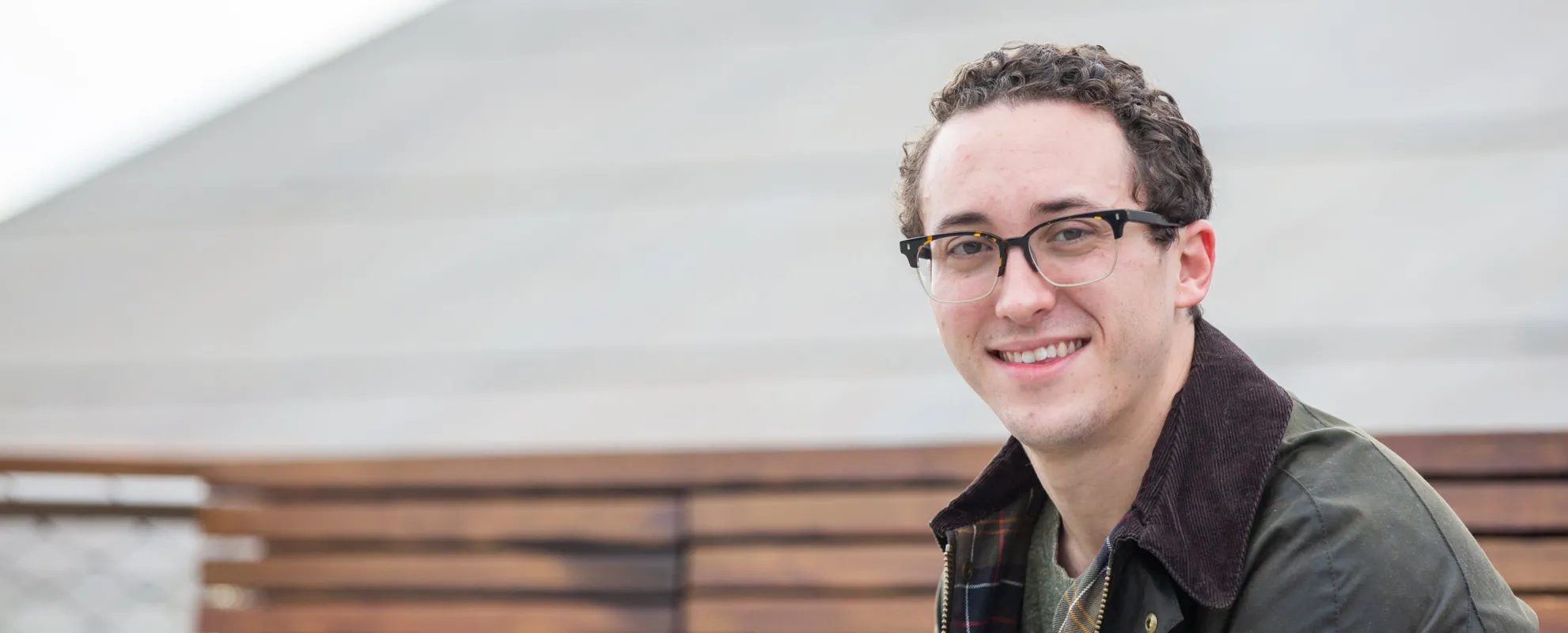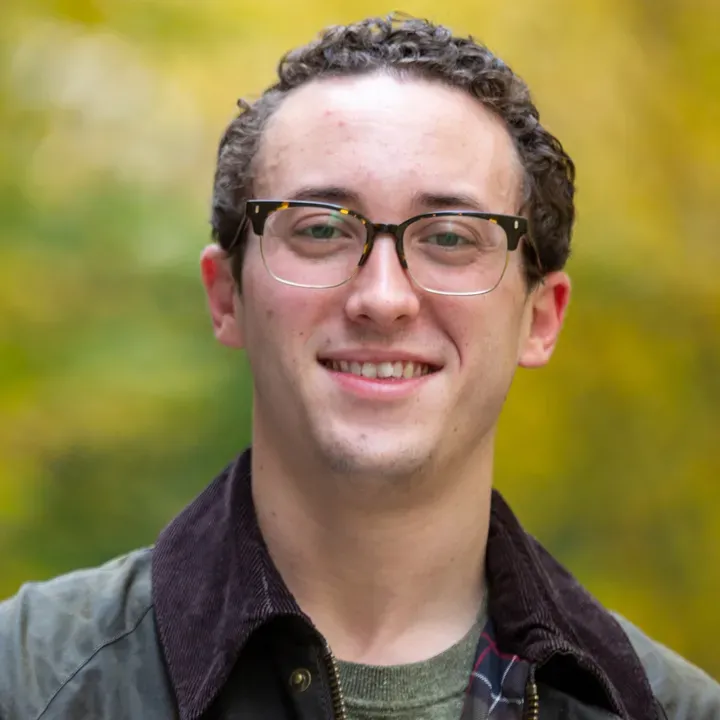During Samuel Leiter’s sophomore year at deteriorating Clarkstown North High School in New York, a deceased rat fell through a ceiling panel above a math class and landed on the desk of a classmate. Looking back, the 27-year-old Stanford GSB student sees that distressing moment as a flashpoint for his interest in public policy.
He pursued that interest throughout his years at Harvard, where he earned a bachelor’s degree in government, but he links that same incident to his eventual decision to pursue private sector work, and his decision to seek his MBA at Stanford.
You focused on government at Harvard, but since then you’ve steered away from public sector work. Tell us more about that evolution.
I did a lot of peer education work with Planned Parenthood, and I was very involved in local education politics in high school. When I got to Harvard, I led our Model UN group and was on the International Relations Council. But a lot of the roles I felt were accessible to me were research-based and fairly academic. I knew I had an instinct to do something mission-oriented. I felt it was important for me to be a doer and understand how to execute on the ideas, and the private sector felt like a better place to hit the ground running.
Is there a single person who most inspired you toward public service?
The first person who comes to mind is my superintendent for my public school district, Meg Keller-Cogan. She actually came on in the year I started at Clarkstown North as a new student in that district. My school, like many public schools, struggled with funding during those years between 2006 and 2010. One of the things that had slid was the state of the facilities. The whole building has steam-pipe heating, which attracts cockroaches and the rats that eat cockroaches. One rat had died in a drop ceiling and fell onto a student’s desk. That led to a nationally televised student walkout on Halloween that was quite a spectacle. An emergency board meeting was called that got very heated, where I ended up speaking. That was my first glimpse into local education politics and local school board governance.
That’s quite a baptism.
People were very upset, as you can imagine. And it wasn’t just difficulties with the facilities, but asymmetries between the two high schools in the district. It was a very negative situation. Through it all Dr. Cogen did an admirable job to facilitate the conversation. She was so new and could have buckled under the pressure, but she held fast and tried to turn a negative experience into a positive opportunity. When I had my chance to speak, I suggested putting a committee together and looking at facilities more systematically to study remedies. She came up to me afterward and took me up on the idea. We ended up putting several committees together. And we put together a big bond proposition that went to a public vote toward the beginning of my senior year.
Did it pass?
No! Which relates to my initial frustration with the public sector. Sometimes you think you’re doing good work, but it’s not always about the analysis at the end of the day. My siblings’ elementary school was actually condemned after the bond proposition failed. Despite the outcome, it was a good crash course for me in terms of the importance of the softer skills I’m trying to work on now. It’s about rallying people to your cause, not just putting together a good argument.
And yet you continued from there to Harvard focused on public sector work.
I wanted to understand how and why the initiative could’ve fallen apart when the analysis, the stakeholder interviews, the focus groups we conducted — it felt like such a thorough treatment. I wanted to understand better what stops good policy from happening. I spent four years studying that topic as an undergrad and didn’t come to any sound conclusion. Part of the motivation in going to the private sector was that maybe my analysis wasn’t robust enough, or maybe if I could have made some better arguments the outcome would have been different. Analysis can be great, but at the end of the day relationships matter. And understanding the emotional undercurrents of a situation are as important as the numbers on the slides.
Sounds like those soft skills have been particularly interesting to you at Stanford GSB.
After four years as a strategy consultant with EY-Parthenon in Boston, I wanted to come back to business school to do some soul-searching and make myself my project. I came in thinking it was going to be the hard skills that would be the most valuable to me, such as learning how to communicate succinctly and how to create an Excel model. But actually it was the soft skills — client management, leading a team with different work styles — that I found the most interesting and valuable.
Any particular classes that have been helpful in approaching that part of business?
I took Irv Grousbeck’s Conversations in Management class earlier this quarter, where we role-play through different conversations you might have as an executive. The topic of my final assignment was derived from something he said early on in the quarter: “It never hurts to put the friend hat on first.” Sometimes there’s tension between being a leader versus being a friend to someone in your organization, and his point of view is that it never hurts to be a friend first. That was such a great summary of a lot of the things I’ve learned. A lot of us feel this obligation to cloak ourselves in the roles we find ourselves in, and that can obscure the humanity of a situation.
Any others?
I’m taking “Touchy Feely” (Interpersonal Dynamics) right now and learning about the importance of meeting people where they’re at. There are a lot of things we take for granted in conversations or embarking on new projects, but it’s worth taking time to understand the environment of that moment. The more I can step back and absorb rather than rush with a bias to action, the more effective my actions are.
You spent more than two years at Inspire Inc., an organization of management volunteers who work to help nonprofits become more effective. What’s the most common mistake nonprofits make?
The biggest discussions we had were around mission fidelity. Our discussions often came down to a disagreement within the management team about what the mission truly was. Those were often the conversations that most needed to happen. We spent a lot of time helping management teams realign on the work they were doing separate from the nuts and bolts of the strategies we were discussing.
What were the most valuable lessons you took away from your experience working on corporate strategies at EY-Parthenon?
The emotions in the room dictate as much as the facts. That was a big one. Also, when I was consulting for various companies, I could see the importance of morale and culture on the success of a strategy. Certainly it takes a lot of skills to understand the health of the market and the position of the company within that market, but seeing what breaks down and what goes wrong between strategy and execution is fundamentally a people question.
Still, your interest in education persists. You interned with The Arena Inc., which helps high school students get advanced education and more easily find jobs. What role did you play there, and why do you think that program is important?
The title we went with was chief of staff, which is funny considering there was no other staff beside me. I helped the founder, Claire Fisher, also a GSB alum (BA ’13, MBA and MA ’18) structure the summer pilot. We brought in 21 students from Oakland Unity Charter School to various employers in the Bay Area for career exploration and coaching sessions over a two-week period. There’s a sense in the U.S. that college is the only path to success, but increasingly students are finding that college may not make sense for them at 18, or at all. We’re trying to give students the ability to explore various things. That’s a different narrative than the singular path to success that’s socialized for a lot of us.
Photos by Kiefer Hickman


